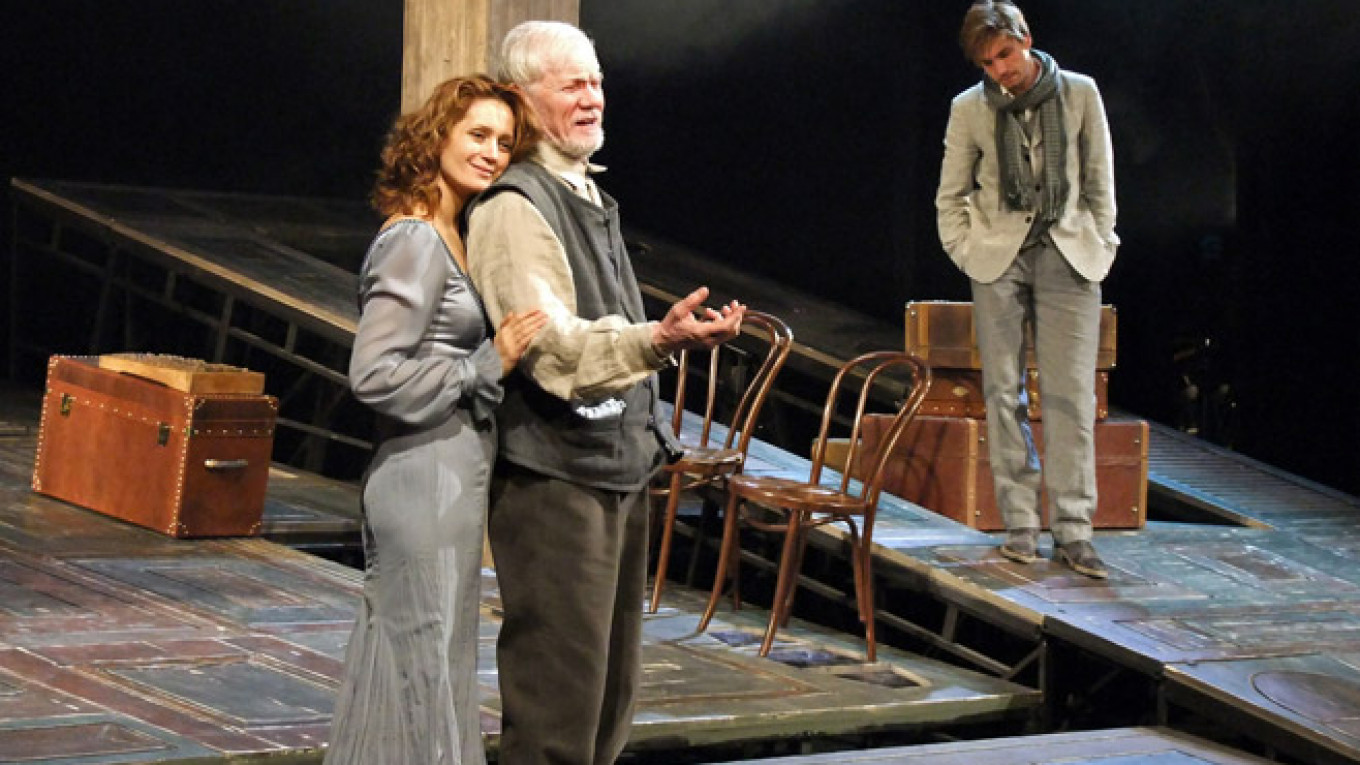Vladimir Mirzoyev's handling of Anton Chekhov's "The Cherry Orchard" at the Pushkin Theater has the ring of a moaning siren alerting folks on a forbidding coastline that a tsunami is on the way. That is, the warning has sounded, but it has come too late to do anyone any good. Everything here will now be swept away.
Maybe I'm reading too deeply into the series of melancholy scenes Mirzoyev put together. Maybe I'm thinking too hard about the play's famous last scene. As Chekhov wrote it, the old servant Firs wanders about alone and abandoned. In Mirzoyev's hands Firs — played brilliantly by Mikhail Zhigalov as a still-young, vital man — is joined by the entire cast.
The problem is that most of them cover their eyes, ignoring what is happening. Charlotte, the family eccentric, plays games with him. It's not all so serious, is it?
I think it is. Mirzoyev appears to have staged this moody production with a black cloud hovering over him. Now it hangs over everyone in Chekhov's play, too.
Mirzoyev pushed one of the key motivating factors in this play a little closer to the front.
Lyubov Ranevskaya returned to Russia from France because her beloved cherry orchard is in danger of being auctioned off to pay back debts. Five years ago she went to France, escaping tragedy at home. Now, she has run from a complicated love affair in Paris and has returned to find more adversity.
The source of it all way back when was the drowning of her 5-year-old son in a pond behind the house. Ever since, Ranevskaya has run from — or at least battled — reality, struggling to reconcile the needs of daily life with the debilitating pain in her head.
Mirzoyev puts the dead child on stage right at the beginning.
The family neighbor and former serf Lopakhin lies in a post-coital chat with the young servant Dunyasha as they discuss Ranevskaya's impending return. But it is the boy, playing distractedly with his ball, whose presence dominates. There are ghosts in this house, and they will exert their influence yet. This place has been doomed ever since that young boy died.
Ranevskaya, as played by Viktoria Isakova, looks like someone doing an admirable job of carrying the weight of the world on her shoulders. She has a measured elegance about her and usually wears a thin smile that projects a heart filled with good will. But she is also short of temper.
Her angriest outbursts are directed at the "eternal student" Petya, formerly her son's tutor and now the clumsy fiance of her daughter Anya (Taisia Vilkova). She humiliates him at will — perhaps as "punishment" for the fact he was once close to her son.
Lopakhin (Alexander Petrov) reminds Ranevskaya time and again that her land is to be sold. He offers an idea to save it — subdivide it and sell off parts — but she is preoccupied with her pain and merely waves him off. Ranevskaya's adopted daughter Varya (Anna Karmakova) is strong and smart but in this household is powerless to do anything.
Also helpless, but of a very different personality, is the family servant Dunyasha (Anastasia Mytrazhik). Bubbly, sexy, always positive and cheerful, she comes across in this deeply melancholy production as a pure spirit of love, innocence and youth. She, too, like all those things, and the happiness she craves, is surely doomed.
No less an endangered species is Ranevskaya's brother Gayev (Maxim Vitorgan), an overgrown child who may be worthy of his nieces' and his sister's love, but is utterly clueless when faced with hard decisions.
Alexander Lisyansky's set consists of a steeply raked stage made of doors and windows that occasionally open to swallow people up. A three-way cross made of thick, wooden beams hovers over it all.
So, yes, Mirzoyev's view of "The Cherry Orchard" is dark and mournful. But what brings it to life are its people with their quirks and weaknesses standing tall in the shadow of their fate. Ranevskaya's understated elegance, Firs' homespun wisdom, Varya's strength and Dunyasha's exuberance all may be cursed, but they are no less beautiful for that.
"The Cherry Orchard" (Vishnyovy Sad) plays Sun., Feb. 20, March 7, 8 and 29. 7 p.m. Pushkin Theater. 23 Tverskoi Bulvar. Metro Chekhovskaya. Tel. 495-694-1289. teatrpushkin.ru. Running time: 3 hours.
Contact the author at artsreporter@imedia.ru
A Message from The Moscow Times:
Dear readers,
We are facing unprecedented challenges. Russia's Prosecutor General's Office has designated The Moscow Times as an "undesirable" organization, criminalizing our work and putting our staff at risk of prosecution. This follows our earlier unjust labeling as a "foreign agent."
These actions are direct attempts to silence independent journalism in Russia. The authorities claim our work "discredits the decisions of the Russian leadership." We see things differently: we strive to provide accurate, unbiased reporting on Russia.
We, the journalists of The Moscow Times, refuse to be silenced. But to continue our work, we need your help.
Your support, no matter how small, makes a world of difference. If you can, please support us monthly starting from just $2. It's quick to set up, and every contribution makes a significant impact.
By supporting The Moscow Times, you're defending open, independent journalism in the face of repression. Thank you for standing with us.
Remind me later.







